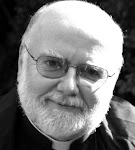My Archdeacon, The Ven. Dr. Paul Wright sent me this...
The Pastor as Narrative Leader
by N. Graham Standish
Humans are living stories of experience. Our lives can be scripted like a narrative. In fact, when we think of individual lives in this way, what we discover is that those who live what seem to be successful lives have a generally compelling life narrative of overcoming obstacles in order to achieve. Those who seem to have dysfunctional lives often have life stories that read like disconnected or stuck narratives in which the main character struggles to overcome obstacles. Instead of overcoming obstacles, these obstacles overwhelm her or his life. Understanding the role of story is crucial to understanding the role narrative plays in leadership.
Over the years I have noticed a definite difference between good leaders and great leaders, a difference that is more than just a matter of great leaders doing certain things better than good leaders. Good leaders lead people toward a goal. They are able to articulate a common aim for an organization, a department, a team, or a congregation. They are able to get people on board enough so that the goals become common goals. And these good leaders are able to motivate people to want to achieve these goals.
What seems to make great leaders great is not that they are better at envisioning and articulating goals, as well as being better at uniting and motivating people to achieve these goals. What I notice is that great leaders seem to craft a story, a story that inspires others in the organization, team, or congregation so that they willingly become a part of and live out this story in their work and lives. Great leaders, through their whole style of leadership, tell a story about the organization or congregation that becomes a blueprint for its ongoing growth.
To be a narrative leader means to be something very similar to a novel writer. It means to be able to see not only life in general, but also a congregation's life, as an unfolding story that to some extent she is the author of. Obviously the pastor is not the author, but then again, most writers of fiction will tell you that they are not truly the authors of their stories either.
Many writers also speak of writing as a process of listening to their muse.
Pastors also have a muse: Christ. The more open we pastors are to the Spirit as we lead, the more the Spirit guides us not only to craft our own story, or the congregation's story, but also to make these stories part of the larger story that God is writing about life throughout the universe. The great pastoral leaders write a story discerned through prayer.
As the author listening to his muse, the pastor recognizes when the congregation is or isn't meshing with God's story. And he finds a way to bring it back into harmony. At the same time, he still sees pain, crisis, death, birth, divorce, marriage, difficulty, and celebration as crucial elements of the story. He understands that without these elements, the story has no life. As a result, he is always looking for ways to turn the more difficult situations into times of redemption, reconciliation, and resurrection.
Adapted from Living Our Story: Narrative Leadership and Congregational Culture, edited by Larry A. Golemon, copyright C 2010 by the Alban Institute.
skip to main |
skip to sidebar

The Rev'd. Gareth Bowen SCP
I am the Vicar of Saint Martin's, Barnehurst in the Church of England Diocese of Rochester. These are some of my sermons. Et benedictio Dei omnipotentis, Patris et Filii et Spiritus Sancti descendat super vos et maneat semper. May the blessing of Almighty God, the Father, the Son, and the Holy Spirit, descend on you and remain with you always.

The Rev'd. Gareth Bowen SCP
Good Links
- Common Worship Morning Prayer
- Saint John's College Cambridge Sung Evensong
- Compline (Night Prayer)
- Saint Martin's Barnehurst
- Rochester Diocese
- Church of England
- ReJesus
- CALL WAITING... Church of England Vocations
- SEITE
- NTMTC
- Heythrop College
- NRSV Online Bible
- Baptism and Confirmation
- Weddings in Church
- Funerals
- BBC Religion & Ethics
- The Guardian Newspaper
- Ship of Fools... Christian Satirical Site
- Shrine of Our Lady of Walsingham
- Society of Catholic Priests
- Affirming Catholicism
- Common Worship Evening Prayer
- BCP Morning Prayer
- BCP Evening Prayer
- Mothers Union
About Me
- Rev'd Gareth Bowen
- Bexleyheath, Kent, United Kingdom
- I am the Vicar of Saint Martin's Barnehurst, Bexleyheath and a member of the Society of Catholic Priests. I am studying for my Masters Degree in Pastoral Liturgy at Heythrop College. This Blog contains some of my sermons. If you find them helpful that's great. Many Blessings, Gareth